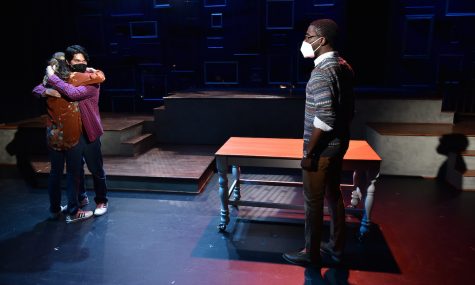Content Warning: This article contains mentions of mental illness.
“They’re the perfect loving family, so adoring,” Senior Roberta Alaman, playing the role of Diana Goodman, sang to open the show.
From the lively musical numbers, emotion-packed scenes, and undeniable stage chemistry between cast members, Emerson Stage put on an unforgettable production of the Pulitzer Prize winning musical, “Next To Normal.” The first performance was held on Friday, Jan. 28, and the following performances on Sunday Jan. 30 and Monday Jan. 31, were added as a result of Saturday’s show’s cancellation (due to the Nor’easter).
As I sat in the seats and awaited the uniquely impactful experience of this production, I took a moment to take in the set. From the living room chair to the kitchen island, the set was simple in nature, yet it delivered all the expected components of an average family home. Three tiered platforms served as different settings, but upon first glance, portrayed a simply average, utterly normal home. The most thought-provoking piece of the set, however, was the myriad of empty frames displayed all along the backdrop.

Throughout the production, the audience finds out that Diana, the mother, suffers from bipolar disorder. She has been subconsciously imagining her son, Gabriel, as a fully grown teenage boy to cope with his loss at a mere eight months old. We watch as Diana tries to treat her bipolar disorder which proves ineffective, leading to her and her families ultimate decision for electroshock therapy at the end of the first act.
In the second act, audience members watch as Diana tries to piece together her life and memories again; yet, she falls short as the last thing she can truly recall is the birth of her son. The musical portrays a family who wants nothing more than a “normal” life, yet covers the complexities of yearning for a “normal” that doesn’t exist. Diana wants to give her daughter, Natalie, a normal life, but who’s to say what normal really is?
Upon first glance, the plethora of empty frames lining the back of the stage made me inquisitive. As the cast performed the final number and the audience leapt to their feet to applaud this remarkable performance, the frames began to make sense to me.
On a surface level, the frames signified Diana’s lost memories and her lack of emotional presence in Natalie’s childhood. Looking deeper, I found these frames portrayed the ways in which we are truly unable to live in and appreciate life’s moments when we are unable to care for our own well being. Mental illness steals the true appreciation and experience of life’s moments from the individuals affected.
The musical has six acting company members and four understudies—a cast of remarkable performers with such interconnectedness and vibrant stage presence.

Senior Isabel Ginsburg played the role of Natalie Goodman, the daughter of Diana and Dan, Gabe’s sister, and Henry’s love interest. Natalie yearns for the love of her mother, desperately trying to gain her attention in any way she can. Ginsburg created a character that really connected to the audience emotionally, and portrayed an individual seeking and simultaneously running from love. However, what stuck out to me most was the chemistry and connection between Ginsburg and sophomore Alexander Serino, who played the role of Henry.
Henry is Natalie’s unexpected best friend and love interest. He embodied everything Natalie did not believe herself to be, and showed her pure love, compassion, and undivided attention. Something she subconsciously wanted, but inevitably tried to turn away from. Henry is absolutely infatuated with Natalie, and would do anything to be with her and show her her worth.
Senior Cedrick Ekra played the role of Dan Goodman, Diana’s husband and the father to Gabe and Natalie. Outside of his incredible stage presence and pure talent, Ekra delivered a truly developed character, taking many comedic approaches that really connected Dan to the audience. Thus, leading to a tremendous impact with the character’s development in the second act.
From the moment Dan is introduced, the audience can understand and relate to the character’s motives and experiences. Dan wants to do everything in his power to make everyone he loves happy, all while neglecting his own happiness and healing until it becomes detrimental to his well being. I think we can all resonate with these complex relationships. The feeling of loving someone so deeply, knowing all you want is their happiness, but forgetting to prioritize your own.
Sophomore Max Connor played the role of Gabe, the late son of Dan and Diana, and the brother of Natalie. The character of Gabe is arguably the most complex in this production. Gabe passed away at eight months old from an intestinal obstruction, but his memory and the idea of the person he would be lives on in the minds of his parents’.
Despite knowing the plot of this musical, I still couldn’t help but feel the immense grief and emotion that filled the room as I watched Gabe grapple with being left behind in his mother’s memory. The scene left a longer lasting impact paired with Alaman’s brilliant portrayal of Diana’s grief.
The bittersweet nature of this moment was truly the most painful part. Knowing that coming to terms with Gabe’s death meant Diana’s health and the formation of a deeper relationship with Natalie, yet the inevitable healing from grief, is the most complex concept. When you are no longer consumed by your grief, you lose a constant presence of the person you’re grieving, however overwhelming the presence of their memory may have been. It is a post-loss loss.
So the performance concludes, the audience applauds, and I am left with a new perspective. What is love, what is joy, and what is life, without sorrow? How do we learn to appreciate memories in the making without the memories of the past, no matter how painful?
“Give me pain, if that’s what’s real. It’s the price we pay to feel.”